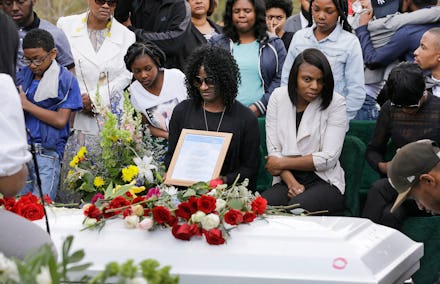Apparently, No One Killed Freddie Gray

For anyone who thinks police brutality in Baltimore is going unpunished, Marilyn Mosby isn't having it.
Although some officers within Baltimore's police force would like the public to see the death of Freddie Gray as a freak accident that followed a string of unfortunate events during his arrest last year, Mosby, the state's attorney for the Charm City, set the record straight.
"We do not believe Freddie Gray killed himself," Mosby said in a press conference Wednesday morning, as her office dropped charges against the remaining three of six officers involved in Gray's April 2015 arrest and death. "We stand by the medical examiner's determination that Freddie Gray's death was a homicide."
Flanked by members of her staff and Gray's father, Mosby offered a forceful condemnation of individual Baltimore officers who she alleged had worked to hinder her office's investigation into 25-year-old Gray's death. No officer who stood trial in the case was found guilty of anything.
But as the nation continues to grapple with seemingly frequent deaths and abuse of African-Americans at the hands of the police, Mosby reiterated a reality that black communities know all too well. Even when the facts are on the victim's side — when a medical examiner rules the death a homicide or, like in so many other cases, police misconduct is caught on video — the justice system is manipulated to make what seems like a home run prosecution nothing more than a theory.
Here's what Mosby's office alleged happened in Gray's case:
On the morning of April 12, 2015, Baltimore officers on bike patrol began chasing Gray.
He may have made eye contact with a police lieutenant before that officer radioed that he was engaged in a foot pursuit with Gray.
Minutes after the pursuit began, Gray surrenders to at least two officers.
Gray is handcuffed and placed in a seated position in a police van, according to Mosby. In court, the state's attorney said the officers had not established probable cause to detain Gray.
As Gray grew angry about his arrest, police stopped the van and shackled him by his legs and his wrists.
The officers re-positioned Gray in the van, but did not properly strap him in before driving off again. An attorney for Lt. Brian Rice argued that officers were rightly in a rush to leave the scene, where an angry crowd began to grow and record the arrest on smartphones.
This is why they failed to buckle Gray's seatbelt, Rice's attorney Michael Belsky said in court.
During a third stop, officers check on the condition of Gray, who complained to officers that he was in pain.
"Despite stopping for the purpose of checking on Mr. Gray's condition, at no point did he seek nor did he render any medical assistance for Mr. Gray," Mosby said in court, adding that the van driver, Caesar Goodson, left the passenger unsecured and kept driving.
Then the police van picks up an additional passenger, even after Gray indicates that he's in need of medical attention.
By this point, Gray is unresponsive.
When the van finally pulls up to its final destination at the Western District station, paramedics are called for Gray. He is rushed to University of Maryland Shock Trauma center, where he goes into surgery. However, Gray dies on April 19, 2015, a week after his arrest.
The medical examiner later ruled Gray's death a homicide.
In June 2015, a leaked autopsy report revealed the extent of injuries Gray sustained in the van. According to the Baltimore Sun's account of the report, Gray suffered a "high-energy injury" that was likely a result of sudden slowing of the police van.
The state medical examiner's office said Gray's death was a homicide because the officers involved in his arrest failed to follow the proper safety guidelines.
In court, however, a jury and the presiding judge over three bench trials couldn't agree with Mosby's claim that evidence showed the officers' negligence.
After a mistrial on account of a hung jury in December, and acquittals in bench trials this year, the state's attorney's office declined to pursue the remaining three planned prosecutions. In a press conference Wednesday afternoon, Baltimore police union president Lt. Gene Ryan said "justice had been done" in the case and criticized Mosby for alleging officers colluded to hurt the prosecution.
Mosby said the conclusion of the Gray case sends the wrong message to the community.
By dismissing evidence such as incidents caught on video and medical examiner reports, someone could argue that no one beat Rodney King. No one profiled, stalked and killed Trayvon Martin. No one shot Tamir Rice, within seconds of spotting him. No one fired on an unarmed Amadou Diallo.
With the outcome in the Gray case, the justice system seems farther away from actually proving that the deck isn't stacked in favor of the police.
Read more: